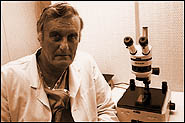 | ||
But Is It Legal?
THERE WAS ONE IMPORTANT QUESTION the EDI people could not answer: whether British law actually permits the importation of American-made embryos. According to HFEA Chief Executive Suzanne McCarthy, a British doctor would have to apply for a license to import embryos from Bill Handel. The HFEA, she says, would be reluctant to grant permission. "This idea that you can go out and buy a baby, or buy an embryo to create a baby, is not something I think the HFEA would find great comfort in, or find itself comfortable with," McCarthy said, adding that the authority still hasn't seen such an application (as of September 1998). It is illegal in the UK to store sperm, eggs, or embryos without an HFEA license. A few infertility programs in Great Britain offer an "egg sharing" system. Women undergoing in vitro fertilization can offer to donate their unused eggs in return for substantially reduced hospital charges. But the HFEA says that free medical care is essentially a payment and plans to eliminate the practice. The question of paying egg donors is just one of many differences between the regulated British system, and the free-market American approach. There are some 120 British clinics licensed to offer in vitro fertilization or donor insemination. In the US, there are more than 350 infertility clinics and dozens of sperm banks. While US practitioners need medical or other degrees to practice legally, there is no specific license for treating the infertile, as there is in Britain. The HFEA keeps a confidential registry of all British egg and sperm donors to help track genetic diseases and prevent human in-breeding; the US does not. The UK regulates how procedures are performed; the US does not. The UK keeps strict controls on when experimental treatments can be offered to the public; in the US, it's buyer beware. Though the British system may restrict some options, many couples welcome the HFEA's close scrutiny. "I don't want people selling parts of their body under pressure because it's market-driven," Sara said. "We need to be very careful about the level of payment. I personally feel the payments are probably too high in America, and people there actually do it for the money." The main British advocacy group for infertile people, Issue, generally endorses the work of the HFEA, according to Chairman Tim Hedgley. He concedes that regulations deny some couples their choice of experimental or controversial treatments and the waiting lists can be long. But the stakes are high. "There's no other treatment or process like it in the world [where] the end result is a living human being," Hedgley said. "So it has to be regulated so tightly. In all situations there will be winners and losers. But I think the winners are all silent winners because they've been protected by the HFEA." Doctor Peter Braude, who inspects IVF clinics for the HFEA, says the British public is comforted by the government safeguards imposed on reproductive medicine. "There's a common spirit of fair play, where the profession and the public feel that certain things are reasonable and certain [things] aren't. And that there is a need to make sure that they keep to certain standards," Braude said. On the other hand, Braude thinks the ban on paying egg and sperm donors may be too strict. "I think there is a need to consider payment," he said. "We need to look at what that boundary is in order to stop more Bill Handels." Some doctors advise their patients to cross national boundaries when government restrictions block their way. For example, Dr. Paul Rainsbury, an infertility specialist in Ilford, is pushing the limits of the system by helping couples choose the sex of their baby - so called "gender balancing." But the HFEA won't permit the practice on British soil. So patients have to fly to Italy to complete the procedure. "I think the HFEA plays a very valuable role," Rainsbury said. "Perhaps we have a little too much [regulation]."
"The problem with reproductive medicine is that it is moving faster than human beings can cope with, in terms of the ethics and social implications," Rainsbury said. Determined - and well-heeled - British couples in search of donor eggs or other scarce reproductive commodities always have one final option, if they can afford it: hop a flight to a more lenient European country, or to the free-market USA. No Money for Eggs home |

